#autotheorie
Text
"Oh what a night" – The case of the BBC Sherlock transmasc aesthetics: Relating to problematic masculinities in search for identity
So I sat down and rewrote this silly essay I wrote one day after returning from my trip to the US. Flaneurism at its best (or at its worst, idk). Please bear with me but definitely send in your feedback if you read and feel like it, it means the world to me and it will definitely help me unpack some of my problematicness! Thank you <3
I take a deep drag of my American Spirit cigarette whilst the tail ofmy long black coat swishes behind me dramatically. Dusk-time Boston is lit up. The skyscrapers towering over my tiny figure are glittering against the dark through the blurry lens of my camera phone.
I am consciously imitating the aesthetic of the modern but also always Victorian BBC Sherlock, in the scene following John and Mary’s wedding, in which the world’s only consulting detective surrenders to his noble, quiet pining for his not-gay best friend.
What even is masculinity, anyway? What would I like it to be?
The creators of the series, Gatiss and Moffat, spent 10 years religiously denying the possibility of a romantic or sexual relationship between the two protagonists, while driving the hordes of fans into delirium every time that Sherlock (Benedict Cumberbatch) and John (Martin Freeman) made love with their eyes or confessed their devotion to one another. Despite the queerbaiting, the homophobia and the sexism in the Moftis series, despite the 4th season fiasco, despite the actors denying the possibility of their characters ever running together into the sunset, Sherlock himself never denied being queer. Gay, asexual, demisexual, the interpretations are many, a breath of representation in the relative democracy of fandom. And as if that wasn’t enough, Sherlock and John end up canonically raising John’s daughter together at their 221B Baker Street apartment.
The modernized urban Victorian aesthetic, the provocatively coded dialogues, the deep homosociality, and the simple, pure bitterness towards the creators, renders the community of Johnlock fans more alive than ever almost 10 years after the series’ finale. In some hidden, bright corners of the internet, like fanfiction.net and archiveofourown.com, women and queers publish analyses and fanfiction in which they explore the endless galaxy of human genders, sexualities, and forms of kinship, writing the insufferably British male characters as women, non-binary, FTM, Alpha and Omega, pregnant, high, and always together - two human animals exploring bodies and experiences that belong to us in the shelter of Baker Street, with their landlady, Mrs. Hudson, being their most ardent shipper. We write entire full-length novels for free, with our sole motive being the exploration, the practice in writing, and the communication with other queers, other women, other people who feel like us and live in different sides of the earth which, despite Sherlock not remembering, keeps on orbiting the sun with the certainty born by a Johnlocker for their OTP being endgame.
Back to Boston now, which looks like Glasgow on steroids, with its red brick buildings and the glass towers that pierce the skies - it doesn’t feel as cozy and familiar to me as European cities, but it is big enough to swallow and hide me, safely, away from the suffocating and often murderous, homotransphobic gaze of my motherland, Greece. Boston feels big enough to make me feel free, invisible, and at the same time more visible than ever.
Here’s how I made it happen: in the name of an egotistical but seductive flaneurism, in the idea that here I can be non-binary and roaming the streets while smoking without thinking that, at any given moment, I might be spotted by the people from whom I’m hiding both facts, I end up romanticizing a stroll on stolen land, as well as the tar in my lungs. I feel the need to wander around, heavily perfumed, with a hanful of product in my hair, dressed androgynously in a way that my mother only accepts because she doesn’t understand the meaning of it, smoking as the soundtrack of Frankie Valli & The Four Seasons’ December 1963 (Oh What a Night) blasts through my old headphones. As a queer person living in Greece, I never felt that the streets belonged to me. I’ve always felt like a pariah looking for somewhere to belong to, and the irony of going after that feeling in America as a white European tourist brings a certain sourness to my mouth. Is that how Columbus felt? Was he a sissy who didn’t feel accepted by his mum in their suffocating mediterranean society? No, fuck that thought. Fuck that circle, fuck everything I've been taught by the writers of history. I decide to leave these streets to their people, without it meaning that I’ve suddenly found the courage to reclaim my own back in motherland.
Exhaustion, flight, cowardice? Survival.
Later I will learn that the American Spirits with the Native American on their turquoise box are anything but native-owned. What’s certain is that, in this trip, I found solace while smoking stolen land.
What does that make me? A citizen of the world?
After all, in the entire trip, I pretend I’m Sherlock, the whitest man to ever white man. It’s not as if I don’t have my own personality - at least I hope that I do. It is that through relating (to fictional characters, actors, role models who remind me of an aesthetic I had to build from scratch for my trans self, with the help of other queer people who created fanart or fanfiction, moulding new arhetypes) I find a vehicle for the exploration of my existence more easily, I see my reflection (or the one I’d like to have) in the mirror. In the fandom nobody tells you how to imagine your favourite characters and how not to. Nobody tells you how to write yourself, and nobody blames you for doing it. You create with self-indulgence, and you’re applauded for it. And that saved my life.
For years I related to a genderfluid Tonks, a trans Remus Lupin, a fanon Jean Prouvaire from Les Mis. Through all those experimentations and games, the changing of clothes in the dark, the opening and closing of the closet door, I found a name for myself: Sam. And Sam, like every other trans masculinity with the name Sam, Skye, Noah, and Eliott, contains multitudes.
For the timebeing, my persona of choice is that of Sherlock, perhaps the most insufferable (and one of the most privileged) characters in the history of British TV (which says a lot). “What do you have in common with that emotionally constipated man?” you ask me because you know that my own sentiments are constantly dancing naked before me. I wonder why that is. Indeed, what do I have in common with that guy and end up projecting so much on him? Me, who hesitates to even cancel a doctor’s appointment in pursuit of constant politeness and people-pleasing (AFAB, you see).
When Sherlock’s landlady, Mrs. Hudson, disapproves of his manners and threatens him with a tete-a-tete with his mother, Sherlock gives her his blessing, saying: “You can if you like, she understands very little”.
Sherlock and his turbulent relationship to his parents. Sherlock who always observes everything while staying outside, because he doesn’t know how to get in. Sherlock, always so different that he’s used to people laughing at him, gaping at him with awe, or wanting to punch him in the face. Sherlock who always attracts attention simply because he functions the way he functions, constantly failing to be a normal human being. Neurodivergent Sherlock, camp Sherlock, forgotten-in-another-era, flaneur Sherlock, who even in the Gatiss series (especially in the Gatiss series) is desperate to love, but he never manages to get it right. And finally, Sherlock the logical, the detached, the cynic: masculine elements that I never managed - and was never allowed to - acquire, and which I desperately, problematically craved, because in society and inside me they have been coded as masc.
I am the opposite Sherlock, and that makes me even more of a Sherlock, I decide, and if that helps me sleep at night, then so be it, for now.
As Hil Malatino writes in the chapter Fall Out Boy is Trans Culture of his essay Surviving Trans Antagonism: “The boy at the center of a [Fall Out Boy track, brackets mine] is [...] being eminently braggadocious and narcissistic [...]. He’s stationed directly at the center of a completely solipsistic universe. No matter how insufferable this kind of guy is in reality, I would have killed for a fraction of his swaggering self-confidence as a kid” (Malatino 2020, 17).
What even is masculinity, anyway? What would I like it to be?
“Do I look like Sherlock?” I ask you, hopeful and doe-eyed as I prance around in my black suit inside the house while packing for the trip. “Sherlock is gender, you know.”
“Do you really want to know how I see your gender? 100% honest-to-God?” you ask mischievously.
“Yes, I do,” I’m hanging from your lips.
“You are, deep inside your soul, in this tartan robe of yours, Bananas in Pyjamas.”
I think about it. Not exactly Sherlock. I smile though. I see my gender in your words. Goofy, boyish, vintage, loud, sleepy, badly dressed: Me. Headcanon accepted.
If headcanon and fanon - that is, reclaimed - Holmes played by (problematic) Cumberbatch teaches me how to be a boy or a man, then so be it, because I hope that my performance will be filtered, as much as possible, through my “girlish” (though still white) sensibilities. That, and the fact that there is a child inside me who never got to live as an openly, unashamedly neurodivergent, inquisitive little boy. Because there is a masculine side inside me that I must hide every day when I go to work. So I put together a playlist, I put on my scruffy headphones, and I tar my lungs, just a little more, a little longer until I’m able to finally leave my country for good and feel ready to love myself as I am. My coat swishes behind me as I dance alone on the street, invisible among the crowd, yet feeling more visible than ever before.
CITATIONS: Malatino, H. (2020). Trans care, University of Minnesota Press. https://doi.org/10.5749/j.ctv17mrv14
#sherlock holmes#johnlock#bbc sherlock#sherlock#queer#trans#transmasc#greece#sherlock essay#sherlock meta#fan essay#fan meta#autotheory#self indulgent writing#translock#trans sherlock#tw: smoking#hil malatino#queer theory#trans theory#queer studies#trans studies#fandom studies#fan studies
25 notes
·
View notes
Text
AGAINST AUTOTHEORY aka THEORY TEXT AS WILLING DILDO
As this confluence with autofiction illustrates, the reduction of theory’s mediations down to amiable oozing incorporates the niche of academic knowledge production into the booming personalist genre industry. Moreover, autotheory comports as dexterous academic labor, projecting a fantasy that courting extra-mural audiences can make up for downsizing in the intellectual professions. Its vulnerability enkindles senior academics bored of theory’s many funerals, imagining eager readerships in a great beyond, and ignites younger academics searching for openings in an economic and professional landscape of foreboding foreclosure; its elasticity bodes a space for young academics to create work and find recognition even though the university as an institution has largely expelled them. Gigification of academic labor crams academic production: manifest your individual take in your individual style with this short-term teaching contract here, this Substack subscriber there. In this way, autotheory must be seen as efflux of a context in which theorists with fair labor conditions like tenure encounter their dire lack of peer audience, and theorists without fair labor conditions hustle for crossover appeal to eke out a living.
Aphoristic form props many of these texts thanks to its elliptical dance of vaporescence and glut, simultaneously pausing and flowing, at once crystal and aporia, snubbing and solicitous. They disrupt linearity, argumentative progression, and academic citation, boarding tiny theses absent plodding hallways. Pushing prose poems like other writers in the literary milieu, these genre melds are charming, accessible. We are drawn out of the realm of abstraction and solicited into a lyrical presence, a seductive proximity that subtracts the medium of theory’s abstractions and generalizations, achieving immersion. Reclining into life-writing, recoiling from argumentation, such retreats attain great resonance and beauty even as they whittle away theory’s distinct value, and recode theoretical knowing from revelatory to idiosyncratic. Immediatist theories posit a smooth continuum of body–experience–knowledge; bolster reflexive, passionate attachments as more legitimate than reason; refuse “symptomatic reading” in order to immanentize content. “It is what it is,” immediacy theory incants.
Such frolicking provocative insurgence of sensuous stimulation against linguistic or conceptual sense erects the theory text as willing dildo. It is bold in its shedding of academic composure, compelling in its self-disclosure, and titillating in its seductive posture—although decidedly unsexy. These are acute and perhaps even vulnerable performances, insuring in advance that assessing them critically would amount to some kind of mean violation—and that seems indeed to be the very point: to be so effulgently bare and corporeally vivid as to preclude distance-taking or concept-making. Immediacy as the unambiguous transmission of affect from author to reader, autonomic responses imagined untainted by the symbolic.
— Anna Kornbluh, from Immediacy
14 notes
·
View notes
Text

An older trans woman once told me that she sits to pee, which occasionally results in her peeing on herself, because that’s how hard she’s worked to block out the fact that she’s still retained her original organ all of these years. That’s what girls do: we deal in affect–feelings, vibes, emotions, moods—to counteract dissonance. If you feel like a girl, you are a girl. Serving cunt is the law of assumption. Pussy-stunting is a mindset. Delusion is a lifestyle. And dissociation is effortless, unselfconscious, easy.
After white men, only white women and girls are afforded an unstudied ease, a universalizing, pedestalizing canvas-like blankness free of aesthetic assumptions, charged with authority and unburdened by race and gender. The rest of us are seen as open wounds. I used to try to fight how I am perceived by feigning a sense of aloofness, insouciance and smallness. I did so by tucking my hair behind my ear, wistfully, longingly staring off into the distance, dissociating from my body to temporarily transport to a place where I could write like a white girl.
I would conjure the white girl vibe instantaneously when I’d listen to music, especially if the music I am listening to is really loud, almost dulling my other senses and causing me to feel what can only be described as the opposite of embodied: void-like. There, I could exist as an empty, diaphanous vessel unfilled by anything at all. There’s no burden of “identity” in the club or the bedroom or the hammam or the garden or online as the avatar of your choosing–anywhere deemed a feminine space worth inhabiting. Online, especially, is where anyone can lay down their burdens—the thick coating of class and race, geography and gender–and escape the indignities of womanhood, blackness, otherness. No fat…no trauma…no spiritual heaviness…no intensity…only purity. A blank canvas no one can ascribe assumptions and project onto. You’re the default player in the game. A babygirl.
As a terminally concerned girl teeming with big, electrical emotions, presenting myself as an open wound–where the id is steering the ship despite societal expectations and pressures to the contrary to flatten and suppress– has never quite appealed to me because I know it doesn’t appeal much to anyone else. I think of myself in relation to others, in a sort of triangulation with the world. I don’t want to be a spectacle, if I can help it, because I know I already am, that there is an audience baked into my experience, mercilessly ascribing the same assumptions to me that they would someone engaging with hallucinations on a city bus. On a city bus, to witness someone mumbling to themselves, smiling exuberantly, screaming, singing terribly or sobbing loudly in public, is to have a front row seat to an undesired excess, intensity and earnestness. That person has unconsciously chosen to present themselves, to the subtly disciplinary gaze of surveilling strangers, like a spectacle to be gawked at. They’ve interrupted the homogenizing edicts of polite society in a manner considered vulnerable, neurotic, unusual, boundaryless, histrionic, unrefined, unserious, grotesque, eccentric, amoral, out of control, shameless and cringe-worthy. Their vivid displays of animatedness, too gauche for “normal” sensibilities, so we’d rather tuck them away like an unsightly pile of rags on the floor, undermining them like we do our own id in the company of others.
This image is commonly associated with the mentally ill and the homeless, whom the public bodies and perceptions of are heavily policed and politicized. States of animatedness, of excess, are also racialized and gendered. Femininity and blackness, its sincerest expressions, deemed maximalist, evidence of effort, and therefore, failure. Too much.
To transcend our animatedness, we must turn our disciplining gaze to ourselves, self-effacing to make space for whiteness and maleness, totally erase ourselves. This palimpsestic quality is achieved through minimalist attire (no garish, colorful clothes re: avant basic), eliminating girlish and black vocal tics, adapting middlebrow tastes, writing in 3rd person, muting one’s melanated state with black and white photography, aspirational thinness so there is less of you, and an attitude that communicates aloofness so severe that you don’t even care about yourself.
These attempts at minimization, of disciplining your public animated body, will allow you to enjoy a certain remove from the wider world. You’ll be cured, no longer teeming with niggerishness and schlepping the mantle of womanhood into every room you walk into for the rest of your life. You’ll be the babygirl again, who you were before you ever knew that you occupy a subordinate role in society, and before you were privy to the myths and ideologies that have been created around your image and identity.
Like a princess, your girlhood and daughterhood had a sense of prestige, making the fact of your consanguinity almost secondary, except as a matter of differentiation from the masses of non-princesses. There wasn’t yet a force larger than life requiring self-minimization as a necessary boon. You were presumed to be a pure, guileless blank canvas of a girl. You didn’t have to arm yourself with knowledge of that—or any truth—to feel a claim to safety and purity because the fact of it was informed by your singularity.
The babygirl, elegantly inert and slow, never had to run outside of the context of a freewheeling and uninterrupted playtime. She was never embarrassed into velocity. She never had to be strong or work hard. She’s never had to learn to self-preserve because her existence hadn’t called for that skill set. Self-preservation is the ministry of wounded girls. The babygirl has never been wounded.
The babygirl is light, buoyant with a feeling she belongs right where she is. She’s preternaturally interested and keenly aware, with an insatiable attention and curiosity for entertainment, her commodities, the objects in her bedroom. She prefers living in a rapt state, the romantic eye of her mind transporting her from her present surroundings and the inherent ennui of girlhood into her imagination.
The babygirl’s emotions don’t give the appearance of an overflowing volcano of lava curdling into evidence of effort and maintenance and failure and toxicity, clumps for other people to step over, ignore, forget, apply a disciplining gaze to. She is like the waves in the ocean crashing freely into each other, free to express the gamut of her emotions, whether sad, irritable, annoyed or enraged, without it sweeping up the rest of her image and identity until there’s nothing left of her but her feelings, in the unforgiving, cynical eyes of the strangers she will meet in the world who will, inevitably, only see animatedness.
What makes me a babygirl–and what unifies me with all the other babygirls online who’re so hotly debated and contested and disbelieved–is our sensitivity and an unrelenting over-identification with objects and other people. Babygirls are committed to the aesthetic reading and viewing of still images, films and the internet, which informs a girly canon of derealization ephemera not intended to be over-identified with: antiheroines, dreams, the moon, theory, book spines, social outcasts, fonts, hysterical and ribald women, “invalid” women who live in their beds, dolls, numbers, voids, the color pink, avatars on social media, God.
All that is ostensibly facile and self-explanatory, for the babygirl, is gleaned through persistent observation. The babygirl fills emptiness with a divine estuary from which an embodied and pillow-soft love audaciously converges with nature’s brutal architecture—pulsating alive with blood and flesh.
Being a babygirl is like the infinitude of the world contained in a pop song or the gaze of someone staring down the barrel of a gun; it stretches on and on forever. Anyone, then, who sees through people like they are vacant homes waiting to be occupied by her, who thinks they know others with the cultic conviction of a true believer, who is wildly and wholeheartedly alert, is a babygirl.
And I am Princess Babygirl.
I am novelty combined with appropriation like collage art, music sampling and recipes. My palimpsest quality is not an encryption of the self; but rather, an illuminating synthesis of my embodied experience. I have been the host to various narratives, epistemes, connections and dreams that I’ve neither fully abandoned nor refined. I’ve imprinted my affects and vibes forever–going on and on like the perfect pop song on repeat–so I can never be erased. Princess Babygirl is who I was before all of the sublimated tensions, marketplace competitions, traumas, vulnerabilities, anxieties, mimetic rivalries, delusions, dreams and violence of womanhood happened to me.
As Carl Jung foretold in his writings on the Age of Aquarius, human consciousness is moving toward a more feminine-centric paradigm. I want to represent the metamodern conditions of this moment in a blend of identity-critical autotheory and audiovisual stimuli exploring affects, aesthetics, taste, psychology, consumerism, the performance of womanhood and modern femininity.
#girls#girlhood#womanhood#gynocriticism#self-optimized girl#identity#cultural criticism#identity politics#girlblogger#writers#substack#vibes#affect theory#collage art#maximalism#minimalism#taste#aesthetics#princess babygirl#babygirl#princessbabygirlforever#autotheory#autofiction#esoteric#femininity#modern femininity#feminism#femcels#it girls#otessa moshfegh
6 notes
·
View notes
Text
read your stupid fucking book and now i i just hate you i think. need to read something for me. i read the argonauts for atulya but that was also for me.
11 notes
·
View notes
Text

The cover of Autotheory as Feminist Practice in Art, Writing, and Criticism (MIT Press, 2021) by Lauren Fournier (image courtesy the publisher)
2 notes
·
View notes
Text
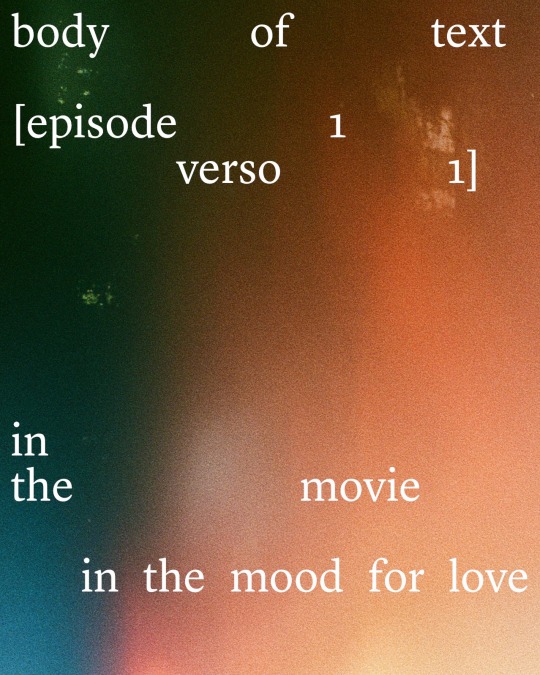

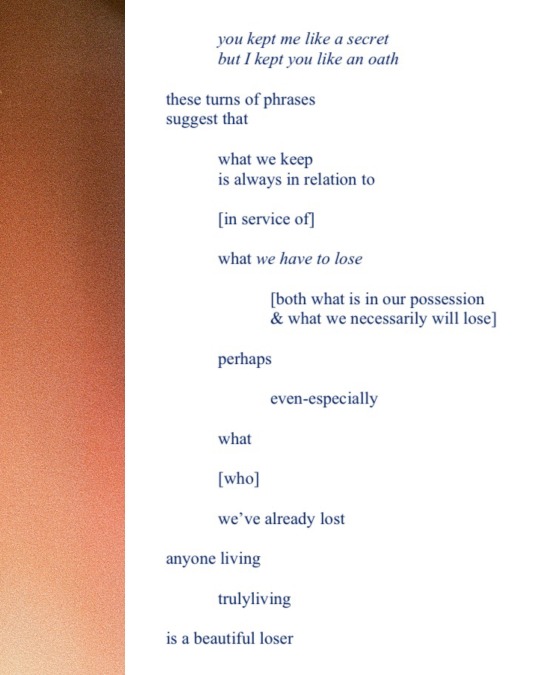
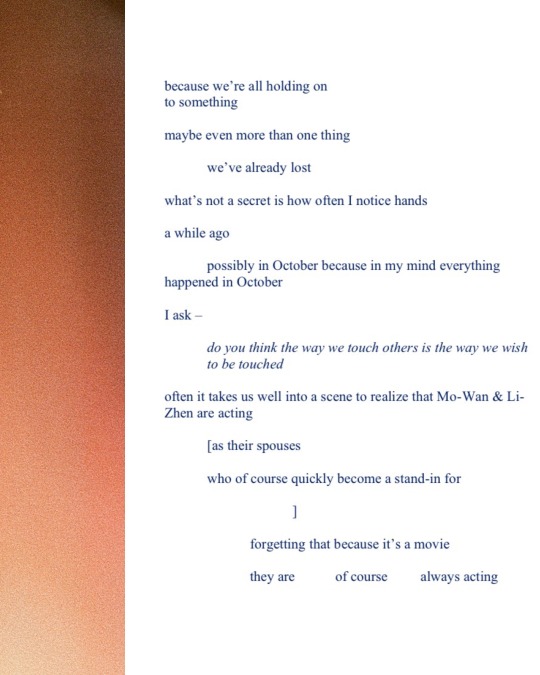
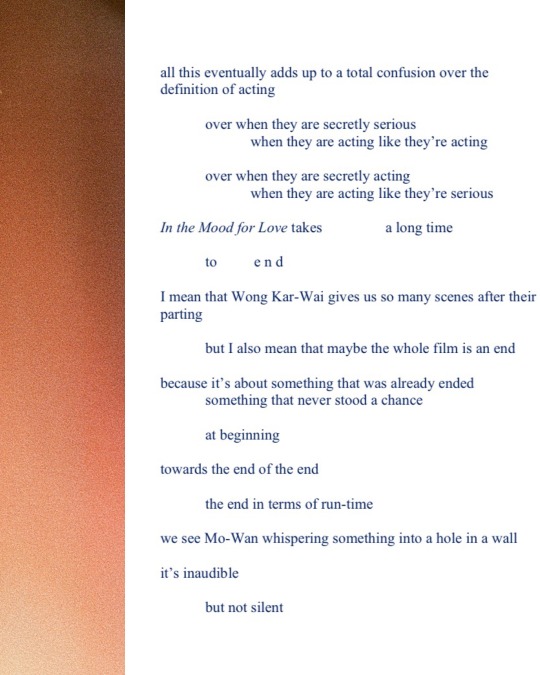
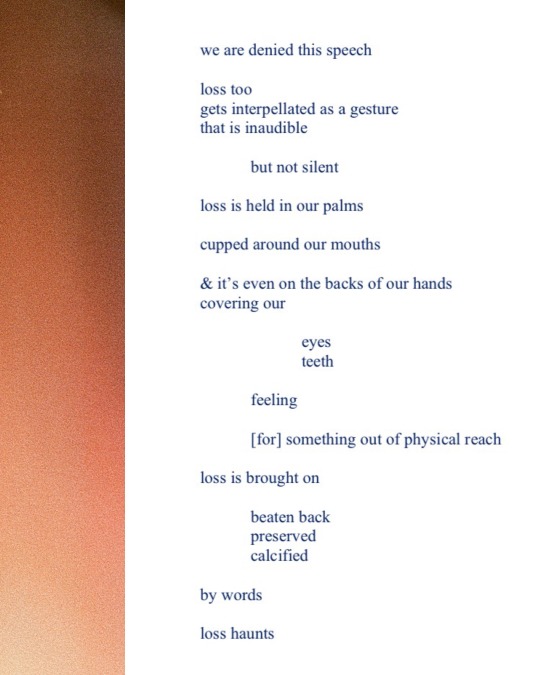

in the movie
In the Mood for Love
Chow Mo-Wan & Su Li-Zhen fall in love
after role playing as their spouses
who are having an affair together
In the Mood for Love is about
how there is no escape for us
[in ]
in pretending to be a secret
they actually become one
accidentally finding
something of their own
to guard
& to lose
in All Too Well (10 minute version)
Taylor Swift sings
you kept me like a secret
but I kept you like an oath
these turns of phrases
suggest that
what we keep
is always in relation to
[in service of]
what we have to lose
[both what is in our possession
& what we necessarily will lose]
perhaps
even-especially
what
[who]
we’ve already lost
anyone living
trulyliving
is a beautiful loser
because we’re all holding on
to something
maybe even more than one thing
we’ve already lost
what’s not a secret
is how often I notice hands
a while ago
possibly in October because in my mind everything happened in October
I ask –
do you think the way we touch others is the way we wish to be touched
often it takes us well into a scene to realize that Mo-Wan & Li-Zhen are acting
[as their spouses
who of course quickly become a stand-in for
]
forgetting that because it’s a movie
they are of course always acting
all this eventually adds up to a total confusion
over the definition of acting
over when they are secretly serious
when they are acting like they’re acting
over when they are secretly acting
when they are acting like they’re serious
In the Mood for Love takes a long time
to e n d
I mean that Wong Kar-Wai gives us so many scenes after their parting
but I also mean that maybe the whole film is an end
because it’s about something that was already ended
something that never stood a chance
at beginning
towards the end of the end
the end in terms of run-time
we see Mo-Wan whispering something into a hole in a wall
it’s inaudible
but not silent
we are denied this speech
loss too
gets interpellated as a gesture that is inaudible
but not silent
loss is held in our palms
cupped around our mouths
& it’s even on the backs of our hands
covering our
eyes
teeth
feeling
[for] something out of physical reach
loss is brought on
beaten back
preserved
calcified
by words
loss haunts
every word we speak
what would Mo-Wan & Li-Zhen lose if they told someone else
how would that even go
what is there even to tell
all this is to say that there is a place for me
a physical place
where I can go
& if I looked out the window now
years later
my heart would still drop
I would
see someone
[who may or ]
there
looking back at me
with the same expression I’m wearing
16 notes
·
View notes
Text
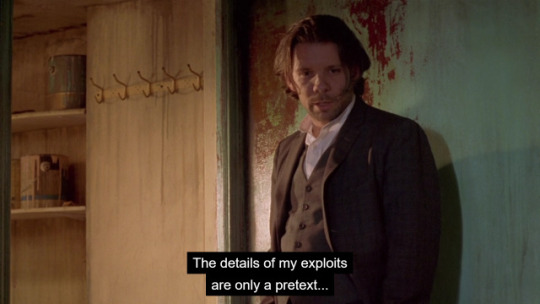
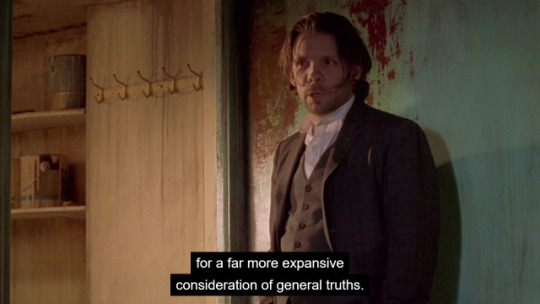
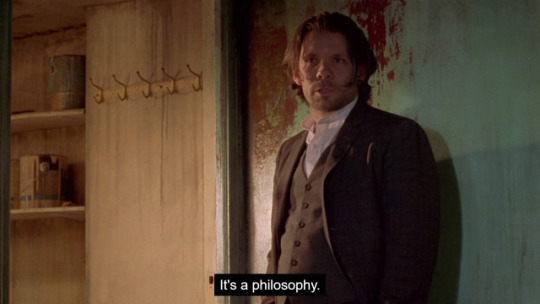

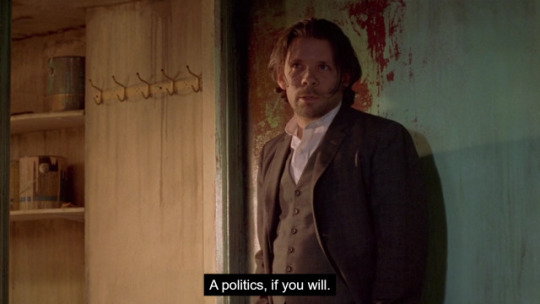

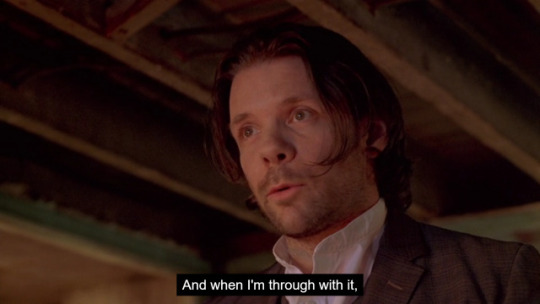

oh he thinks he's me.
(Henry Fool (1997), dir. Hal Hartley)
6 notes
·
View notes
Text
not me learning what autotheory is and being like “oh so what I’ve been doing this whole time that my undergrad professors & high school teachers said was wrong? but my grad thesis advisor encourages it? bet!”
#gotta love library science#grad school tag#my posts#av goes to grad school#autotheory#library science
9 notes
·
View notes
Text
~ for one month · one month after ~
i want to tell everything, a tell-all, a kiss and tell, but i don’t know what the everything, the all, the tell is. I want to reveal all the grubby little parts of the experience as it happened. Everything happens so much. The happening never stops. Everything that has happened is still happening. That’s what this little experiment is doing: a textual tongue feeling around the gummed site created by, excavated by, an experience; an imperfect, fumbled translation; some kind of ongoing dance—the what-could-have-been and the what is-right-now, and right-now, and right-now, done badly, without knowing all the steps.
~
Subscribe for more...
#creative writing#trans pride#lgbtqia+#writers on tumblr#substack#amwriting#autotheory#autofiction#top surgery mention#medical negligence mention#bhanu kapil
3 notes
·
View notes
Text
1 note
·
View note
Text
Queer writing/PhD/book sideblog
If you are interested in my queer autotheoretical musings, follow me on betweenthefolds95.tumblr.com

#sideblog#queer#queer theory#queer writing#feminist writing#autotheory#maggie nelson#my writing#thoughts#words#gay#trans#lgbtqia#lgbt#memoir#autobiography#ohwhataniight#between the folds
1 note
·
View note
Text
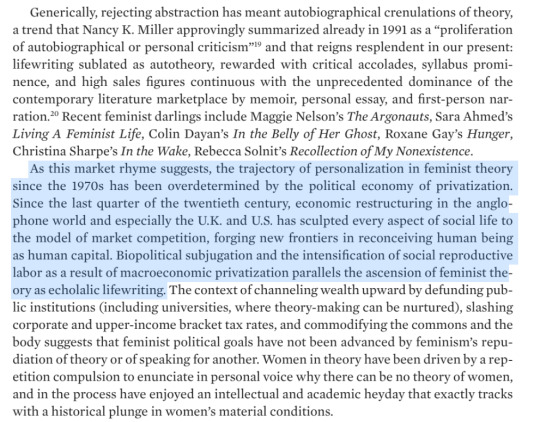

In Defense of Feminist Abstraction, Anna Kornbluh
1 note
·
View note
Text

Forget Me Not is not just a gin…
It’s an opportunity to support the arts and acknowledge the positive contribution creative industries make to society.
Literature, visual and performance art touches our lives daily. Sadly, arts funding everywhere has been cut over the past decade, affecting many artists at the outset of their careers. We want to help plug the funding gap so that tomorrow’s important artists get the support they need to reach their full potential.
See our Projects section for more information on how we will use profits from Forget Me Not to support arts programmes around the world.
Caitríona Balfe x

Our Projects
We will regularly update you with information on the arts projects we are funding from our profits. We are proud that our first project has been to sponsor the SWG3 Graduate Programme.
The SWG3 Graduate Programme is a 12-month sponsored studio residency and commissioning programme open to artists and designers each year. The programme has been running since 2005 when SWG3 and has become one of the most sought after opportunities in the UK for creatives to continue to develop their practice after higher education.

SWG3’s accessible approach to the arts, and their focus on early stage support for creative talent has enabled over 60 graduates to date to benefit from their studio programme, and go on to become established, successful practitioners.
The application process opens every September, and is available to all current year graduates and leavers from arts and creative industry practical courses who can show a studio based approach to their work, and a real commitment to their practice.

PROJECT 1
Amanda Seibæk
Amanda Seibæk is a Danish artist who works across painting and printmaking.
As a graduate of Glasgow School of Art, Seibæk works with autotheory – connecting multiple fields of knowledge, never deeming any irrelevant for her explorations. This she uses as a tool to describe turmoil in contemporary life though a more poetic lens. The subject rages from neuroscience through to mundane weekend tales told by her friends.
Materially, Seibæk connects the mediums of painting and printmaking. She sees colours in layers and with colours she shapes her figures. When connecting print and paint she tries to develop a language where print is not locked, but rather freed by the brush as a playful tool to make sense of something intuitive.


An unforgettable taste
Forget Me Not is a smooth botanical gin exquisitely distilled and lovingly handcrafted in Scotland, with hints of citrus and delicate floral notes including Lavender and touches of Elderflower. Created with love by Caitríona Balfe.
Botanical ingredients:
Juniper / Coriander Seed / Liquorice Root / Angelica / Rosehip / Elderflower / Lavender / Orange Peel / Beetroot / Coconut
(Always) remember… Forget Me Not gin is best served over ice with classic tonic and garnished with a slice of orange & sprig of fresh mint. — Forget Me Not Gin
Who doesn’t love a built-in “Remember?” 😝
#Tait rhymes with hat#Good times#Forget Me Not Gin#🍸#FMNGin#Scottish Gin#Support The Arts#Save The Arts#SWG3#Glasgow School of Art#Glasgow#Amanda Siebæk#Website update#5 July 2024#Thanks thetruthwilloutsworld
35 notes
·
View notes
Text
what i like nearly the best about the argonauts is when it’s about art. i like that she writes as if she knows a little bit about art, but not that much, which is both true and a lie. autotheory works better “about” art than “about” literature (“poetry”) because it sets up a fun little obstacle course of description that’s always at the fulcrum of art history. i always love to read this (or “watch” it, as it feels.) but then, i like and do art theory and i don’t like and don’t do poetry. hb does it better—obviously. i think art is of course as about the problem of representation that she (a poet) says language is about and which structures relationships (love). i think that the throughline of misread barthes is more or less cute and certainly mastery (not mistake). i actually l really liked that she says maybe there is a clean relationship of representation in this arena of the visual and then sets up a foaming rosalind krauss to yell at you about it. i can say this as a rosalind krauss stan. i love that nelson shows you krauss scolding you (us, the artist, the author) for not understanding barthes and i can so clearly see this: maggie nelson does understand barthes, but she doesn’t understand rosalind krauss. this makes me kind of euphoric in an inversion of the author’s playing-dumb about art.
where i find the book romantic is also about art: when she talks about art she is telling you about the world of her love, which is an approach i will always submit to. art is his and not hers. she does not watch poetry the way she watches artists, not really. (there’s the ann carson scene i guess.) doing so would reveal more about the structure of the problem than she wants to. it’s like i said when i was looking at tweets by poets mad at this poet, calling autotheory an op: this is poets problems with poets about poetry and so on—this is not my problem…
she writes of rosalind krauss accusing the barthes-misreaders of having brains rotted from maternity. but two years before the argonauts rosalind krauss published a (humble opinion) much better work of autotheory about medium at the end of the 20th century in the wake of her own loss of capacity (brain rotted) from an aneurysm. comparing these two books has finally put something together about what it is i should do…
10 notes
·
View notes
Text
when autotheory/autocriticism and I guess autofiction is good it can be really good but lately everything I've read that's been doing that has felt so flat to me. I think it's like petrarchism in that it's saying like I have the richest and most special inner life in the world but the way you go about saying that is always the same. and the auto writing moment is obviously so quotational but it doesn't seem to be aware of being so totally derivative in the same way
#this is probably not saying anything new but I'm reading a book that's pissing me off but does have information that's#useful to me so to push thru it I needed to put this in words#sp
12 notes
·
View notes

